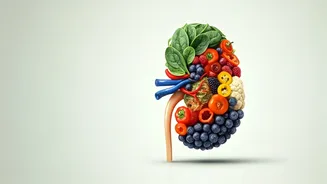Embracing Kidney-Friendly Foods
Certain foods are particularly beneficial for kidney health. They provide essential nutrients without overworking the kidneys. Firstly, consider incorporating
foods rich in antioxidants and low in potassium and phosphorus, which are easier for the kidneys to process. Then, focus on options that support overall health and reduce strain on your kidneys. Fatty fish such as salmon and tuna are packed with omega-3 fatty acids, which help reduce inflammation and are gentle on the kidneys. Another excellent choice is blueberries. These are rich in antioxidants, helping to protect the kidneys from damage. Red bell peppers are also a great addition to the diet. They are low in potassium and offer vitamins like A and C. Finally, olive oil is a healthy fat option that is heart-friendly, indirectly benefiting kidney health due to the close relationship between heart and kidney function. Consuming these foods regularly can aid in maintaining kidney function.
Foods to Limit
Certain food choices can negatively affect kidney health. It is essential to be aware of foods that can put extra strain on the kidneys and potentially lead to kidney-related issues. The key here is to limit substances that can harm kidney function and focus on foods that can support kidney health. Foods high in sodium can raise blood pressure, a significant risk factor for kidney disease, so it is best to reduce your salt intake. Processed foods, fast foods, and many packaged snacks often contain high levels of sodium. Another food to limit is red meat. Consuming high amounts of protein, particularly from animal sources, can increase the workload on your kidneys. Carbonated beverages, especially those with high sugar content, are also detrimental to kidney health. Over time, excessive sugar intake can contribute to obesity and diabetes, which are risk factors for kidney disease. Lastly, avoid excessive consumption of foods high in potassium and phosphorus unless directed by a healthcare professional. These include many fruits, vegetables, and dairy products.














